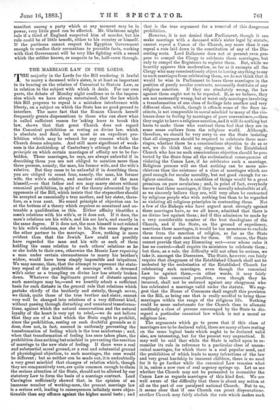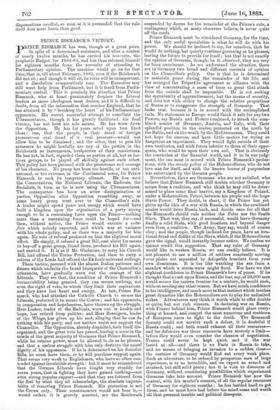THE MARRIAGE LAW IN THE LORDS.
THE majority in the Lords for the Bill rendering it lawful to marry a deceased wife's sister, is at least as important in its bearing on the relation of Canonical to Statute Law, as in relation to the subject with which it deals. For our own parts, the debate of Monday night confirms us in the impres- sion which we have always entertained, that the law which this Bill proposes to repeal is a mistaken interference with liberty, on a subject on which the State has no good ground to interfere. The mere fact that the Roman Church herself frequently grants dispensations to those who can show what is called sufficient reason for 'asking leave to break this law, shows that that great Church does not regard the Canonical prohibition as resting on divine law, which is absolute and final, but at most as an expedient pro- hibition which may be relaxed for any reasons which the Church deems adequate. And still more significant of weak- ness is the Archbishop of Canterbury's attempt to define the principle on which certain marriages of affinity are to be for- bidden. These marriages, he says, are always unlawful if in describing them you are not obliged to mention more than three persons, namely, the man, his former wife, and the wife's relative. But they cease to be unlawful if in describing them you are obliged to count four, namely, the man, his former wife, the wife's relative, and another relative of the man himself,—so that father and son may marry sisters without canonical prohibition, in spite of the theory advocated by the opponents of the Bill, which insists that the stepmother should be accepted as canonically a true mother, and her sister, there- fore, as a true aunt. No sound principle of objection can be at the bottom of a theory which requires so unnatural and un- tenable a qualification as this. Either affinity identifies a man's relations with his wife's, or it does not. If it does, the man's relations are his wife's, and his are her's, and exactly in the same degree. If it does not, the man himself is not related to his wife's relations, nor she to his, in the same degree as the other partner to the marriage. Now, nothing is more evident than that the Jewish Law could not possibly have regarded the man and his wife as each of them holding the same relation to each others' relations as he or she holds to their own, otherwise the Mosaic Law requiring a man under certain circumstances to marry his brother's widow, would have been simply impossible and iniquitous. We may assume, then, that the attempt to represent the statu- tory repeal of the prohibition of marriage with a deceased wife's sister as a trampling on divine law has utterly broken down. Whatever the legitimate ground of distaste against such marriages may be,—and we heartily admit a sufficient basis for such distaste in the general rule that relations which partake chiefly of the brotherly and sisterly, though never, we think, quite those of the true brother and sister, cannot• very well be changed into relations of a very different kind, without passing through disturbing and unnatural transforma- tions, against which the natural conservatism and the natural loyalty of the heart is very apt to rebel,—we do not believe that they are of a kind which the State ought to prohibit, since the prohibition, resting on such doubtful grounds as it does, does not, in fact, succeed in uniformly preventing the transformation of feeling which is the true misfortune ; and,
when that transformation of feeling has once taken place, the prohibition does nothing but mischief in preventing the sanction of marriage to the new state of feeling. If there were a real and substantial moral ground, or a real and substantial ground of physiological objection, to such marriages, the case would be different ; but as neither can be made out, it is undoubtedly a very great mischief that changes of relation which, though they are comparatively rare, are quite common enough to claim the serious attention of the State, should not be allowed by our statutory Law to form the basis of a marriage contract. Lord Carrington sufficiently showed that, in the opinion of an immense number of working-men, the present marriage law is a serious evil, leading to consequences infinitely more objec- tionable than any offence against the higher moral taste ; and that is the true argument for a removal of this dangerous prohibition.
However, it is not denied that Parliament, though it can make marriage with a deceased wife's sister legal by statute, cannot repeal a Canon of the Church, any more than it can repeal a rule laid down in the constitution of any of the Dis- senting sects. Lord Dalhousie does not at present even pro- pose to compel the Clergy to celebrate these marriages, but only to compel the Registrars to register them. But, while we heartily approve this moderation, so far as it exempts all the Clergy who may conscientiously object to having anything to say to such marriages from celebrating them, we do not think that it would be wise in Parliament to leave these marriages in the position of purely secular contracts, necessarily destitute of any religious sanction. If they are absolutely wrong, the law against them ought not to be repealed. If, as we believe, they are not necessarily wrong, but at worst only marriages involving a transformation of one class of feelings into another and very different class, which, though it offends some of the finer in- stincts, is not comparable in moral mischief to many of the vio lences done to feeling by marriages of pure convenience,—the® they ought to have a religious sanction, and it will do nothing but harm to make those who contract them feel that they are in some sense outlaws from the religious world. Although, therefore, we should be very sorry to see the State insisting that all clergymen should be required to celebrate these mar- riages, whether there be a conscientious objection to do so or not, we do think that any, clergyman of the Established Church who has no such conscientious objection should be pro- tected by the State from all the ecclesiastical consequences of violating the Canon Law, if he celebrates such a marriage. Religious persons will see that nothing can be more mis- chievous than the existence of a class of marriages which are good enough for secular morality, but not good enough for re- ligious sanction. Such a condition of things would be a great premium on pure secularism ; and, in point of fact, everybody knows that these marriages, if they be morally admissible at all, as we sincerely believe they are, will very often be contracted by religious people who wish nothing less than to be regarded as violating all religious principles in contracting them. Not a few of the Bishops who have argued most strongly against these marriages have, as we all know, admitted that there is no divine law against them ; and if this admission be made by a very considerable number of the best theologians of the Church, and if the State, on the ground of expediency, sanctions these marriages, it would be too monstrous to exclude them from the sanction of religion, so far as the State can secure any such sanction for them. Of course, the State cannot provide that any Dissenting sect—over whose rules it has no control—shall require its ministers to celebrate them ; but then, as a rule, the difficulty will not often be serious, we take it, amongst the Dissenters. The State, however, can fairly require that clergymen of the Established Church shall not be molested by the ecclesiastics of the Established Church for celebrating such marriages, even though the canonical Law be against them„—in other words, it may fairly require that canonical penalties, even though they be incurred, shall not be enforced against any clergyman who
has celebrated a marriage valid under the statute. We sug- gest that the House of Commons shall engraft this provision
on the Bill, as being one that is really needful to bring these marriages within the range of the religious life. Nothing could be more unfortunate for the Church than to alienate needlessly a class of persons encouraged by the State to dis- regard a particular canonical law which is not a moral or religious law.
The arguments which go to prove that if this class of marriages are to be declared valid, there are many others resting on the same logical basis which ought to be declared valid also, are interesting, but for the present very unpractical. It may well be said that while the State is called upon to re- consider its rule in reference to a particular class of unean- onical marriages, for which there is a real popular need, and the prohibition of which leads to many infractions of the law and very great hardship to innocent children, there is no need for it to go further while the canonical Law remains what it is, unless a new case of real urgency springs up. Let us see whether the Church may not be persuaded to reconsider the Canon Law as regards marriages of this kind first. We are well aware of the difficulty that there is about any action at all on the part of our paralysed national Church. But to us, it seems clear that if one Church can grant dispensations, another Church may fairly abolish the rule which makes such dispensations needful, so soon as it is persuaded that the rule itself does more harm than good.



































 Previous page
Previous page